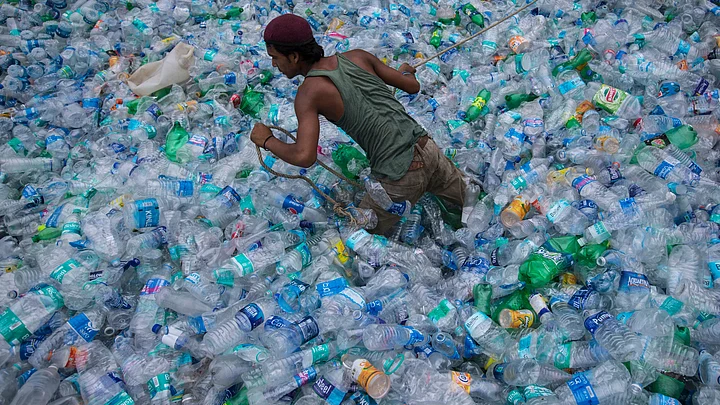Researchers estimate that more than 8.3 billion tonnes of plastic have been produced globally since the early 1950s. Over the same period, the rate of plastic production has grown faster than that of any other material worldwide. About 60% of that plastic has ended up in either a landfill or the natural environment.
If current trends continue, our oceans could contain more plastic than fish by 2050.
India is addicted to plastic. It generates over 4,354 tonnes of non-biodegradable plastic waste every day, according to a 2016 report by the Central Pollution Control Board. A knowledge paper by FICCI (2017) adds:
• Indian plastic processing industry saw compounded annual growth rate of 10% between 2010 and 2015.
• Annual plastic consumption is expected to increase from 12 million tonnes to 20 million tonnes by 2020.
Cristofer Costes, a French actor and a self-taught inventor have designed a low-tech machine that converts plastic waste into diesel and petrol, which he said could help fight pollution and provide fuel for remote communities in developing countries.
According to Indiatimes:
Christofer Costes says he’s developed a machine capable of breaking down plastic into a liquid fuel. ‘Chrysalis’, as it’s called, feeds bits of plastic into a 450-degrees-Celsius reactor to pyrolise it, which is a way of decomposing the plastic with high heat. The machine churns out a liquid through this process that’s 65 percent diesel, that Costes says can be used for generators or boat motors, 18 percent petrol usable for heating or powering lamps, 10 percent gas for heating, and 7 percent carbon for crayons or colorants.
This (pyrolising) breaks up the plastic molecules and transforms them into lighter hydrocarbons. They go up into the distillation tower, and separate into diesel, petrol and at the top of the tower, there is gas, which is stored in a reservoir.Christofer Costes to VOANEWS
According to IndiaTimes, Costes worked with the environmental organisation ‘Earth Wake’ in order to develop the Chrysalis, and they hope to develop the prototype into a commercial device priced at about 50,000 euros. Right now, the machine can transform up to 10 tonnes of plastic into fuel per month.
(At The Quint, we question everything. Play an active role in shaping our journalism by becoming a member today.)
